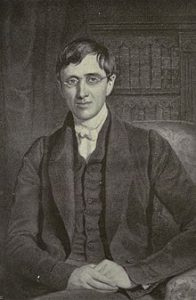Here are three very human examples. Please see if you can identify the theme we’re talking about.
 First example: A friend wrote this: “When I was younger I was playing golf with my dad. I hit the ball in the rough, so my dad advised that I should just pick a club that would get me out of the rough and not try to go for the green. I argued that I had done it before and that I could easily go straight for it. When I got to the ball I realized that it was actually a really tough shot. I should have just swallowed my pride, admitted that my dad was right and changed my club. But I was too stubborn to admit that and just swung extra hard. Needless to say the ball went all of two feet. Not only did I feel instant regret, but I also now had to face the exact same decision. Did I learn my lesson? No. I swung hard several more times, and ruined the rest of my round of golf.”
First example: A friend wrote this: “When I was younger I was playing golf with my dad. I hit the ball in the rough, so my dad advised that I should just pick a club that would get me out of the rough and not try to go for the green. I argued that I had done it before and that I could easily go straight for it. When I got to the ball I realized that it was actually a really tough shot. I should have just swallowed my pride, admitted that my dad was right and changed my club. But I was too stubborn to admit that and just swung extra hard. Needless to say the ball went all of two feet. Not only did I feel instant regret, but I also now had to face the exact same decision. Did I learn my lesson? No. I swung hard several more times, and ruined the rest of my round of golf.”
The second example, this time, comes from the father of the story. He may be wise about golf, but not about his own health: He won’t take pain killers or anti-inflammatories even though he needs them. Do you know why? “Because,” he says, “That’s how Bruce Lee died!”
The third example is more tragic. I told you once before that my father didn’t have a job for years. This was devastating for his self-confidence and self-esteem. And it was horrible for our family because we always had to cover for him staying at home. Why couldn’t he find a job? There were many reasons, but the main one was that he couldn’t get along with people. No matter what job he found, he would always end up not getting along with someone and seeing that someone else was doing something wrong, and then he’d find a way to lose his job. We know this because, once he changed his attitude, he never lost his job.
So what are we talking about today? Stubbornness and pride. One person who proofread this homily said, “You know what you’re talking about today? “Male.” Now women, don’t do anything right now, like elbow your husband in the ribs, ok? Let me handle it. It’s true that guys have a big problem with this. But actually all of us have pride and stubbornness. We have problems admitting we’re wrong, trying a new way that someone shows us (even if it looks like it’s better), going to a doctor, going to confession, or fixing a problem in our life that just keeps on coming up over and over again.
So, why don’t we change? We want to look good in people’s eyes; there’s something in us that likes to do it our way and not listen to other people. We’re insecure, even though we try to hide it. Sometimes we’re just unreasonable and childish: “I don’t need medicine!”
I think my dad didn’t change his ways for over a decade, because it hurt to admit that basically, for most of his life, he had been making mistakes. Could you imagine admitting to everyone that, for your whole life, you’ve been following the wrong path, that your ideas are horrible, that you’ve made so many mistakes? I know how hard that can be. But here’s the thing: if we don’t admit it, the pain gets worse.
Jesus gives us, as usual, a powerful parable today that exposes the sinfulness of pride and stubbornness. In the parable, the first son is wrong but changes his mind; the second son thinks he’s right but is actually wrong and doesn’t change his mind. Jesus comments that St. John the Baptist came preparing the way for Jesus, showing the way of truth, and sinners believed him. But the proud, that is, the chief priests and the scribes, even after they saw it, did not change their minds and believe (Mt 21:32)!
The question for us is: Once we see the truth, will we change our minds? Jesus asks the same question but in a different way: “Which of the two did the will of his father?” (Mt 21:31). Obviously, the first son, the one who changes his mind. You see, the point of life is not to be right or wrong; the point of life is to do God’s will, to follow the truth, even if it means we have to change our minds.

 Do you remember the story about Professor Robert George, of Princeton University? His whole life he believed the point of discussions was to win (which makes us feel good because “We’re right!”). But, in college, he read Plato’s dialogue Gorgias which said that the point of argument and debate is not to be right and to win, but to find the truth. So, whenever we’re together and we’re debating or discussing, if the point of discussion is to arrive at the truth, that means all of us are on the same side. It’s not about winning. The point is to get to the truth. And, if I’m wrong on something and someone corrects me, then they’ve just done me the biggest favour ever because they’ve moved me from error to truth. That’s the greatest victory of all! We should be really happy whenever someone corrects us or shows us a better way.
Do you remember the story about Professor Robert George, of Princeton University? His whole life he believed the point of discussions was to win (which makes us feel good because “We’re right!”). But, in college, he read Plato’s dialogue Gorgias which said that the point of argument and debate is not to be right and to win, but to find the truth. So, whenever we’re together and we’re debating or discussing, if the point of discussion is to arrive at the truth, that means all of us are on the same side. It’s not about winning. The point is to get to the truth. And, if I’m wrong on something and someone corrects me, then they’ve just done me the biggest favour ever because they’ve moved me from error to truth. That’s the greatest victory of all! We should be really happy whenever someone corrects us or shows us a better way.
Bl. John Henry Newman was born in 1801 in England. He became a priest in the Anglican Church, and, because he was a genius, he became one of their most prominent theologians. But after much study, he decided to become Catholic. He famously said, “To be deep in history is to cease to be a Protestant,” (An Essay on the Development of Christian Doctrine, Introduction, Part 5) because, when one studies church history, we realize that Jesus founded only one Church and the evidence points to it being the Catholic Church.
So, do you think he regretted everything he wrote before he became Catholic, because some of his ideas would be ‘wrong?’ No, because he wasn’t interested in being right, but in finding the truth, and all that he wrote before his conversion was part of that search.
That’s why he says, and I’d like you to remember this because this is the point of today’s homily, “To live is to change, and to be perfect is to have changed often” (An Essay on the Development of Christian Doctrine, Chapter 1, Section 1, Part 7). So if we’re going to grow, we’re going to have to make a lot of changes in our lives. And if we’re going to reach perfection, we’re going to have to make even more changes.
This doesn’t mean making random changes like, “Today I’m Catholic, next year I’ll be Muslim, after that I’ll be Buddhist.” It means we keep making changes in our life to conform to the truth. So, we all know God exists. But if He really exists and wants us to become like Him, then we have to make changes every single day to become more loving, and more merciful. Many people know God exists but have to keep on making changes in their lives to understand how good He is and how much He loves them. Many people know God is God, but they don’t know Him as a Father.
Parents have to change their parenting style with each child because the best way to love each child is to do what’s best for that individual. And, as the child grows, they have to keep on changing their parenting style. We don’t change morality to fit the child, but we change the application of moral principles (for example, being more or less strict).
I myself have made many changes as a priest. When I first became a priest eleven years ago, on some things I was very strict, while on other things I was very lenient. I was easy on holding people to certain standards because I thought that was the best way to love them and bring them home. But eventually I realized, “This isn’t working. Some people are lying to me about fulfilling these requirements. They’re not coming closer to Jesus.” So I decided that I should become more strict because that was the more loving thing to do. On the other hand, I used to be more strict on other things. When preaching, I rarely smiled and was a bit aggressive and confrontational. Then I realized, “This isn’t the most loving thing to do. I better become more gentle. I also never wanted to do a welcome announcement during Mass because I thought it took away from the sacredness, but then I realized this human touch is important and we can still maintain the sacredness.
So here are a few things we can do:
1) Because our stubbornness and pride causes a lot of damage to us and the people around us, if we’re ready, we should ask the Holy Spirit to show us our faults. Maybe our stubbornness flows from a place that needs healing. Pray and ask God about it.
I want to challenge everyone to do one concrete thing today: Would we be willing to ask one person in our life, “Do you see any stubbornness or pride in me? Where? How?” You get to choose whom it is you ask. It’ll be fun, trust me! Being willing to ask is a measure of humility.
2) Please be quick and happy to say, “Oh, I didn’t know that,” or “I was wrong about that,” or, “I take that back.”
 3) We need a lot of humility in our life, and the most humble person ever, next to Jesus, is our Mother Mary. She’s never proud because she knows everything she has comes from God. And though she was sinless from the beginning, she still had to grow. We talk about the Immaculate Conception, which refers to the fact that Mary was conceived without sin; yet in spite of this, she grew. She was still challenged by God to ponder things she didn’t understand (Cf. Lk 2:19,51).
3) We need a lot of humility in our life, and the most humble person ever, next to Jesus, is our Mother Mary. She’s never proud because she knows everything she has comes from God. And though she was sinless from the beginning, she still had to grow. We talk about the Immaculate Conception, which refers to the fact that Mary was conceived without sin; yet in spite of this, she grew. She was still challenged by God to ponder things she didn’t understand (Cf. Lk 2:19,51).
Jesus gave her to us as our mother and we need her in our life. She shows us how to be humble. But some won’t go to her. I wonder: Is it because we’re proud? Some of us may think, “I’ll just go straight to Jesus.”
Now let me ask you a question: If I have cancer, should I pray or go to the doctor? Both! Right! If I go to the doctor, does that mean I have no faith in God? Of course not. Because God gives me the doctor and medicine so that I can be healed. But, couldn’t some people say, “I want to go straight to God and not to the doctor?” But God expects us to go to the doctor. In the same way, God gave us a spiritual mother, and expects us to go to her. If I go to our Mother Mary, does that mean I have no faith in God? Of course not. If God expects us to go to our mother, in the same way, He expects us to go to the doctor.
Just to remind you, on November 5th, we’re starting a month of prayer to know and love Mary more. The more we know and love her, the more we’re going to love Jesus. If we can love Jesus the way our Blessed Mother does, then we’re really going to grow. Next week, we’ll have the books for sale and explain more how the month of prayer works.
So what is it in our life that isn’t working? There’s something in our life that is not working because we’re stubborn and proud. And so, it’s not being right or wrong. It’s about truth. “To live is to change, and to be perfect is to have changed often.”


